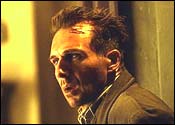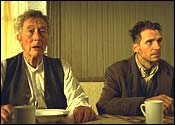 | « Back to article | Print this article |
David Cronenberg's previous outings -- particularly Naked Lunch (based on the seminal junkie novel by William Burroughs), Dead Ringers (with Jeremy Irons as deranged twin gynaecologists), The Fly (with it s weird AIDS metaphor) and Crash (with its twisted sexuality) -- took special glee in gross-out effects that left you wondering about the director's intentions.
s weird AIDS metaphor) and Crash (with its twisted sexuality) -- took special glee in gross-out effects that left you wondering about the director's intentions.
You asked yourself: Is he for real? Does he never want to be taken seriously? What's with the exploding heads anyway? What about the talking-insect hallucinations? And, sooner or later, you wondered: Is he really Canadian?
There were no answers, of course, other than to the last question. In case you are still asking, Cronenberg is Canadian. That may explain a lot of things -- the off-centre humour, the outsider aesthetic, the lack of regard for Hollywood.
With Spider, Cronenberg has pulled off something he has never before attempted. It is his best work, made so well that it is easily among the best movies of the year.
The film owes everything to its two British stars, Ralph Fiennes and Miranda Richardson. Their sexually charged ballet is the centre of the film. It is a relationship that evokes the Oedipus myth, as well as the Freudian question: Angel or whore?
As the Beckettian schizophrenic Dennis Clegg, Fiennes has produced the role of his career. He mutters to himself constantly, feverishly making extensively detailed (though entirely illegible) notes, keeping an eye out for hostile interlopers and bits of string or stone. Clegg, who wears four shirts at a time, has just been released from an institution where he spent 20 years for an unspecified crime.
Richardson's unholy triptych -- as Clegg's mother, as a neighbourhood prostitute and manageress of a halfway home -- is a virtuoso turn. She takes special delight in her role and is never less than astounding.
The film's main trauma, the murder of a parent, becomes something altogether more unmanageable as its atmosphere builds. Clegg's real terror is of women. If schizophrenia is fear multiplied, Clegg's fears make his mother into a terrifying everywoman.
Those sequences may remind the viewer of moments in other Cronenberg films, particularly some of his early horror films, but in Spider the director has been transformed into a craftsman of character.
There are long sequences where we see Fiennes walking on a street or sitting on a bench, wordless moments when nothing needs to b e said and nothing is. But the director packs each scene with a building sense of horror. And Fiennes makes it difficult to take your eyes off him.
e said and nothing is. But the director packs each scene with a building sense of horror. And Fiennes makes it difficult to take your eyes off him.
As the young Glegg's mother, Richardson is demure. As the prostitute, she is unrecognisable, her hair and teeth distinctive. Though there are giveaways: Both women drink gin. As the landlady of the halfway home, she is just right: stiff and yielding in equal measures.
This film is unusual in many ways, but most of all, it is unusually good. The climactic scene when Fiennes realises the nature of his affliction is as taut as the best horror.
At the same time, it is more than horror, going beyond genre. Spider is great cinema.